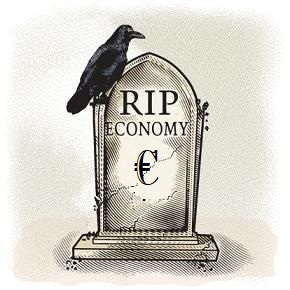The Evolving Euro Crisis: What’s Next for Europe?

As we navigate through the tumultuous waters of European politics and its volatile economy, it’s impossible to ignore the escalating tensions and deteriorating economic conditions. The Euro is falling sharply, reaching its lowest point in two years, raising questions about its future. Is the Euro destined to hit 85 cents in the coming year? This situation is not merely the outcome of market fluctuations; it is wrapped in political complexities and broader economic discontent.
The War Against Russia: A Trigger for Economic Downturn
European leaders are increasingly tied to their military ambitions against Russia, and this strategy has resulted in dire consequences for the Eurozone’s economic stability. Instead of implementing necessary reforms to restore confidence and bolster the economy, we see a reliance on sanctions and military engagements as scapegoats for the looming collapse of the Euro.
In a recent address, Russian President Vladimir Putin highlighted military attacks against Russian facilities and lamented the global implications of the ongoing conflict in Ukraine. This narrative resonates throughout Europe, yet media portrayals often fail to consider the broader consequences of continued aggression.
Political Standoff and Economic Fallout
While the European press may seem committed to maintaining the narrative of righteousness in this conflict, many analysts at Extreme Investor Network caution that this stance contributes to the ongoing economic collapse. There is a distinct failure to address root causes and admit mistakes. As inflation rises, and living standards fall, many Europeans are starting to question the wisdom behind their governments’ decisions.
The notion that Putin is a "dictator" supported by Western media outlets raises an eyebrow. In contrast to leaders like Ursula von der Leyen, whose unelected position speaks to a different type of governance, Putin was elected and garners support from segments of the Russian population. The focus on war as a solution to complex geopolitical issues seems increasingly out of touch with reality.

Bitcoin: A New Financial Frontier
Interestingly, Europeans are tapping into Bitcoin as an alternative asset class. This revelation brings to light the shifting financial sentiments across the continent.
While some believe Bitcoin could challenge the dominance of the dollar, it’s more realistic to see it as a supportive asset during economic instability. In an age where monetary elasticity is paramount, the rigidities of past systems like Bretton Woods serve as lessons for today’s policymakers. A responsive approach to money supply is vital; otherwise, we risk repeating history’s mistakes.
Currency and Political Chaos
Recent military developments, such as Russia’s introduction of a new missile system, are entering the political spotlight. The lack of coherent responses from the UK, France, and Germany’s governments raises concerns about their capability to navigate complex international crises. As nations grapple with military commitments in Ukraine, there’s a growing sentiment of distrust toward both Western leaders and the Ukrainian government among neighboring countries.
Towards a New Economic Paradigm
The impact of historical agreements, like the Minsk Agreement, and the breakdown of trust in Western alliances have fostered a narrative shift, particularly within former Yugoslav states. Many are beginning to see the West as an unreliable partner and are increasingly aligning with Russia—an unsettling trend for those advocating a united European front.

Projections for the Future
Looking ahead, markets are bracing for potential rate cuts from the European Central Bank in response to these ongoing crises. Expectations have intensified, with a potential 50 basis point cut by December now on the horizon. Political instability, particularly in Germany—the Eurozone’s largest economy—further compounds the Euro’s decline.
Our models indicate the possibility of the Eurozone disintegration, a crisis analogous to prior systemic failures of centralized governments. As we progress further into an uncertain future, it’s critical to pay attention to these underlying economic dynamics that threaten not only Europe but also the global economic landscape.
At Extreme Investor Network, we remain committed to keeping our audience informed about these developments as they unfold. Understanding the economic forces at play is essential for navigating this complex new world order.
Stay tuned; the evolving story of the Euro and European politics is far from over.

